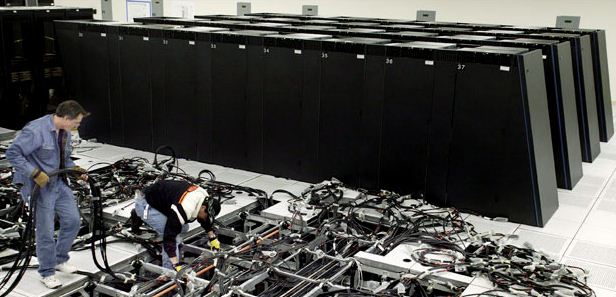DARPA plans exaflop supercomputer for 2018
Posted: Mon Nov 08, 2010 6:59 pm
DARPA plans exaflop supercomputer for 2018
By Mark Brown.

"Less than two weeks after China declared ownership of the world’s most powerful supercomputer -- a 14,000 CPU beast capable of pumping out 2.5 petaflops of mathematical prowess -- US defense agency DARPA has already announced plans to take back the crown."
North America was the previous champion of the hotly contested competition with the 1.75 petaflop Cray XT5 in Tennessee. But after being knocked off the top spot by Beijing, the United States is gearing up for a legendary comeback.
DARPA plans to work with Intel to bypass the petaflop level, and move onto exaflops -- computing speeds of one million trillion calculations per second. That’s a thousand times faster than Tennessee and Beijing’s smart boxes.
The applications of such a supercomputer are a little more humble than you might imagine. Instead of curing cancer or finding extraterrestrial life, the machine will be “establishing complex connectivity relationships within graphs”. “Think of determining ‘six degrees of Kevin Bacon’ relationships on Facebook,” a spokesperson for the San Diego Supercomputer Center helpfully explained. Plus, the machine will be used for rapid processing of real-time sensor data and complex strategy planning.
The machine won’t be here until 2018, with the first two phases of the project intended for completion in 2014. The lengthy wait is due, in part, to needing to reinvent basic facets of computing to achieve such ambitious processing speeds under efficient power consumption.
“Today’s crude and simplistic memory cache and prefetch policies won’t work at the exascale level because of the tremendous energy costs associated with that motion,” said Allan Snavely, associate director of the Supercomputer Center. With today’s technology, moving a single exabyte of data would apparently need a “nuclear plant’s worth of instantaneous power.”
Also at the center, San Diego is building the first flash memory-based supercomputer system, named Gordon, which will enter operation a little sooner -- in 2011.
By Mark Brown.
"Less than two weeks after China declared ownership of the world’s most powerful supercomputer -- a 14,000 CPU beast capable of pumping out 2.5 petaflops of mathematical prowess -- US defense agency DARPA has already announced plans to take back the crown."
North America was the previous champion of the hotly contested competition with the 1.75 petaflop Cray XT5 in Tennessee. But after being knocked off the top spot by Beijing, the United States is gearing up for a legendary comeback.
DARPA plans to work with Intel to bypass the petaflop level, and move onto exaflops -- computing speeds of one million trillion calculations per second. That’s a thousand times faster than Tennessee and Beijing’s smart boxes.
The applications of such a supercomputer are a little more humble than you might imagine. Instead of curing cancer or finding extraterrestrial life, the machine will be “establishing complex connectivity relationships within graphs”. “Think of determining ‘six degrees of Kevin Bacon’ relationships on Facebook,” a spokesperson for the San Diego Supercomputer Center helpfully explained. Plus, the machine will be used for rapid processing of real-time sensor data and complex strategy planning.
The machine won’t be here until 2018, with the first two phases of the project intended for completion in 2014. The lengthy wait is due, in part, to needing to reinvent basic facets of computing to achieve such ambitious processing speeds under efficient power consumption.
“Today’s crude and simplistic memory cache and prefetch policies won’t work at the exascale level because of the tremendous energy costs associated with that motion,” said Allan Snavely, associate director of the Supercomputer Center. With today’s technology, moving a single exabyte of data would apparently need a “nuclear plant’s worth of instantaneous power.”
Also at the center, San Diego is building the first flash memory-based supercomputer system, named Gordon, which will enter operation a little sooner -- in 2011.